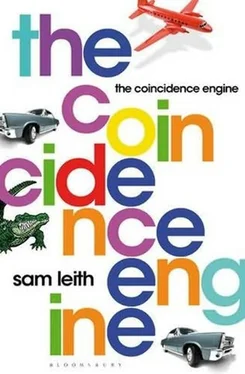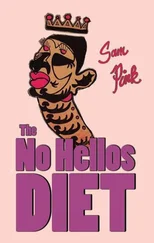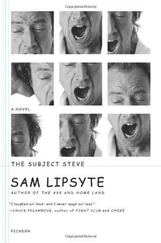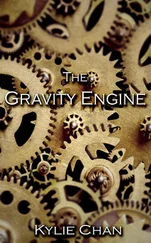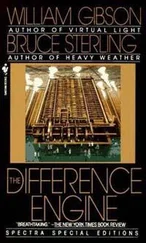Gumbo Lake was an enormous swamp ten or fifteen miles to the north of where Fisk had been found. Fisk’s tree had been a couple of miles west of Axis, off the 13, which went up to Mount Vernon.
‘What sort of job were you doing?’ As she asked, Bree realised she knew the answer.
‘Ubba darnzer.’
‘A dancer. You’re a stripper.’
‘Ubba darnzer ,’ he insisted, but his face, even through the drug haze, looked bashful and a little bit pleased with itself. He attempted what would have been a well-practised, flirtatious, long-lashed look. The effect was not as he would have intended, but the attempt was enough that Bree could feel herself colouring at the base of her throat. She felt cross.
‘Uh wuz onna urrway,’ he continued, not noticing or minding much. ‘Saw uh member. Uz drivin’. Larss thing uh member. Driving.’ The casts bumped on the table as he attempted a shrug, then winced as he remembered what trying to shrug with two broken arms and a fractured collarbone felt like. ‘Then uhz year.’
‘You don’t remember anything else? You didn’t stop, didn’t get out of the car, didn’t meet anyone?’ Like, anyone carrying a commercial passenger plane? Bree thought but did not say.
‘Ur gur. Nuh .’ He struggled a little in the mist. ‘Yerrr. Uh gud ou’. Uh member. Or nuh. Uh think. Gudda pee.’
Oh shit, thought Bree, not knowing if or how she was supposed to help him do that – and it seeming likely it would bring another nurse.
‘Pee. Beer. Heh. Uh gudda.’
Bree realised, with relief, he was still remembering. He looked confused again. ‘Uh gud urr. Iss winnndy.’ He made the whooshing noise again.
And then his face shone and his lids sagged. ‘Uzz inna plane… Inna… Hadda mos’ amazin’ dream…’
Bree got up. She didn’t know what she knew, and she couldn’t think of anything else to ask because she didn’t know what she didn’t know. That was normal. That was her job.
‘Saw rrainbow,’ said Fisk. ‘Byooofu’. ’Mazin’ dreammm…’
‘Thank you, Mr Fisk,’ she said, but he wasn’t really noticing. She left.
As she crossed the parking lot to the Chrysler, she ran over the conversation in her memory. She didn’t speculate. There was never any value in speculating. But something nuggeted in her mind.
‘I’m not a pilot,’ he had said. ‘I told the policeman.’
Bree, who had seen the records, thought: What policeman?
An amazing dream.
Fisk, subsiding back into morphine sleep. Going down through the layers. There was a humming of bees. The air all around him was wet and it smelled of tin and electricity. The trees were dark, dark green and the sky was grey in all directions.
He was driving a car. Not his own car. He knew in the dream that it wasn’t his own car, but it somehow belonged to him. The car was a vintage Plymouth as big as a whale. Fisk wallowed in a wide front seat upholstered in blood-covered leather. Fat drops of rain were splatting and dragging across the windshield, hauled sideways by the wind.
Rain was wetting his cheek. Fisk had the windows open. He knew he had a passenger, on the front seat with him – he could see them from the corner of his eye – but he couldn’t bring himself to look round. He wasn’t scared of his passenger – sharer , he thought; my passenger is my sharer – but something prevented him from turning his head to look. His eyes were on the road.
He cruised on the speed limit. Fifty-five miles per hour, but the scenery changed only very slowly. He felt unease as he looked ahead, at the road pulling towards him lickety-split, and the scenery making its way sluggishly past like a moving staircase with the handrail out of sync.
A bit away from the highway, before the treeline, he could see the gator fence. There were gators lined up behind it. They were moving their limbs slowly, purposefully. One, then another huffed and lolled and then, with lazy weight, started to haul themselves up the fence vertically, link by link. He noticed the passenger ( sharer , he thought again) was gone. Nobody was there.
The wind picked up, flapping erratically into the driver-side window. It was sheety and gusty and it tasted like batteries on his tongue. Fisk suddenly realised that the car wasn’t moving at all. The road continued to spool towards him, but it was a special effect, like in an old movie. He realised he needed to pee.
He was outside the car, standing by the highway. Fisk was experiencing something halfway between memory and hallucination.
He didn’t remember getting out of the car, but he could see it. There was somebody, he couldn’t see who, driving it, and somebody on the passenger side. The wheels were turning – whitewalls blurred – but it was keeping level with him.
Here in the wind he felt scared. The wind caught his cuffs and belled his sleeves out with a great sad sound like a foghorn. The navy fabric of his uniform trousers, wet from the rain, clung to his legs like Saran wrap. His captain’s cap flipped up and vanished horizontally, end over end, out of his sight before he could turn to see it. He turned his back to the wind. The sky ahead, back down the highway where he had come from, over the delta, was black as stone.
He moved his hand to his zipper, and POOM! He was nowhere.
‘The coincidence engine is starting to work. I saw it with my own eyes.’
The Intercept was from nobody. It had been more or less sieved from static. Shortwave frequencies, an echo of an echo. The original signal was, they thought, perhaps, a fax; it still retained some formatting features. But its origin and its destination were unknown, and the very fact that they found it continued to be a source of bafflement. It was a one in a million shot: the equivalent of getting a crossed line and hearing your best friend’s voice from the other side of the world.
It wasn’t even a term the Directorate’s officers had been specifically searching for. But ‘coincidence engine’ was close enough to send up a flag: they’d been combing for ‘probability’, ‘paradox’ (since that had been the inaccurate but hard-to-shake term that had briefly attached to the project), ‘singularity’, ‘Heisenberg’ (in variant spellings) and a half-dozen other key terms and areas. Red Queen, who made no secret of not being a scientist, explained to the Directorate’s staff that they were looking for ‘weird stuff and people who seem to know about miracles’.
But then that was more or less a description of what they’d been doing ever since those wackos around the second Gulf War revived the Directorate of the Extremely Improbable. Red Queen would have preferred to work in the State Department, and Red Queen had made this noisily clear – which was almost certainly why Red Queen had the job. In this department, producer capture was not a good idea.
But the arrival of the Intercept, coming so soon after the hurricanes and the satellite photograph, had seemed too much of a… well, there it was.
Someone had flagged it, and now it was here.
The hurricane blew through the junkyard and it made a plane. I saw it. First the gathering wind, and then the sky was filled with metal clashing and screaming and spinning. Rivets swarmed. Currents of air dashed and twirled plates, chairs, tin cans, girders and joists, pinging and banging off rocks. Noise like you never heard. Unholy howl. Rushing and screaming.
Knock, knock, knock and the metal clashing and curving and denting and sticking with great screams. Beyond conception. Beyond seeing. The panel of a trailer. The corrugated sides of a container cracking and flattening. A flash in the middle of it, right in the middle, of a tiny man suspended in air, pedalling his legs like he’s treading water and his tiny mouth open and his eyes little dots of terror. Something forming around him.
Читать дальше
